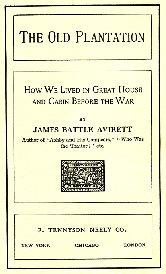12 Mar. 1835–16 Feb. 1912

James Battle Avirett, Episcopal priest, author, and Confederate chaplain, the son of Serena Thomas and John Alfred Averitt, was born on the Averitt plantation near New River Chapel and the present town of Richlands. Avirett, who adopted this spelling of the name, was a student at The University of North Carolina from 1850 through 1852. In 1861 he was ordained to the diaconate by Bishop William Meade. When the Seventh Virginia Cavalry was organized on 17 June 1861, Avirett was named chaplain to this unit, which came to be known as Ashby's Cavalry. When Avirett died he was reputed to have been the last surviving Confederate chaplain.
From 1865 until 1871, Avirett conducted Dunbar Institute, an Episcopal seminary for young ladies in Winchester, Va.; afterward, he was rector of churches at Sligo, Silver Spring, and Upper Marlboro, and at Waterville, N.Y. In 1894 he became rector of St. Paul's Church, Louisburg, N.C., where he served until his retirement in 1899. During the period from 1867 to 1901, Avirett wrote four published works. The Memoirs of General Turner Ashby and His Compeers was published in 1867. Watchman, What of the Night? or The Causes Affecting Church Growth was published in May 1897 by St. James's Church, Kittrell, and St. Paul's Church, Louisburg, both served by Avirett. The text of the pamphlet was the sermon he preached before the Eighty-first Annual Convention of the Diocese of North Carolina. In September 1897 he published another pamphlet, Who Was the Rebel ? his 17 Sept. oration at the foundation stone ceremony for the North Carolina Plot in the Stonewall Cemetery, Winchester, Va. Avirett's fourth published work was the book The Old Plantation: How We Lived in Great House and Cabin before the War, which appeared in 1901.
Avirett married Mary Louise Dunbar Williams of Winchester, Va., and they were the parents of two sons, John Williams and Phillip Williams. John W. Avirett became editor of the Cumberland (Md.) Evening Times, and when James Avirett retired, he went to Cumberland to live with his son and often contributed articles to John's newspaper. Avirett died in Cumberland and was buried in Winchester.